Shelby Heinecke
Robotic VLA Benefits from Joint Learning with Motion Image Diffusion
Dec 19, 2025Abstract:Vision-Language-Action (VLA) models have achieved remarkable progress in robotic manipulation by mapping multimodal observations and instructions directly to actions. However, they typically mimic expert trajectories without predictive motion reasoning, which limits their ability to reason about what actions to take. To address this limitation, we propose joint learning with motion image diffusion, a novel strategy that enhances VLA models with motion reasoning capabilities. Our method extends the VLA architecture with a dual-head design: while the action head predicts action chunks as in vanilla VLAs, an additional motion head, implemented as a Diffusion Transformer (DiT), predicts optical-flow-based motion images that capture future dynamics. The two heads are trained jointly, enabling the shared VLM backbone to learn representations that couple robot control with motion knowledge. This joint learning builds temporally coherent and physically grounded representations without modifying the inference pathway of standard VLAs, thereby maintaining test-time latency. Experiments in both simulation and real-world environments demonstrate that joint learning with motion image diffusion improves the success rate of pi-series VLAs to 97.5% on the LIBERO benchmark and 58.0% on the RoboTwin benchmark, yielding a 23% improvement in real-world performance and validating its effectiveness in enhancing the motion reasoning capability of large-scale VLAs.
LoCoBench-Agent: An Interactive Benchmark for LLM Agents in Long-Context Software Engineering
Nov 17, 2025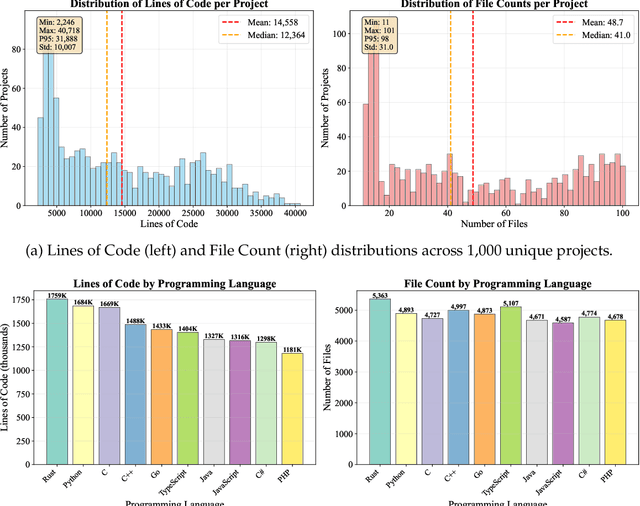


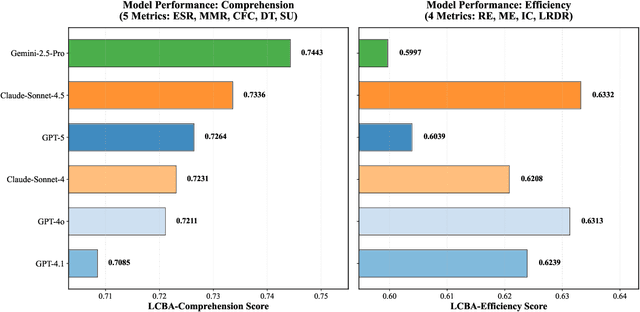
Abstract:As large language models (LLMs) evolve into sophisticated autonomous agents capable of complex software development tasks, evaluating their real-world capabilities becomes critical. While existing benchmarks like LoCoBench~\cite{qiu2025locobench} assess long-context code understanding, they focus on single-turn evaluation and cannot capture the multi-turn interactive nature, tool usage patterns, and adaptive reasoning required by real-world coding agents. We introduce \textbf{LoCoBench-Agent}, a comprehensive evaluation framework specifically designed to assess LLM agents in realistic, long-context software engineering workflows. Our framework extends LoCoBench's 8,000 scenarios into interactive agent environments, enabling systematic evaluation of multi-turn conversations, tool usage efficiency, error recovery, and architectural consistency across extended development sessions. We also introduce an evaluation methodology with 9 metrics across comprehension and efficiency dimensions. Our framework provides agents with 8 specialized tools (file operations, search, code analysis) and evaluates them across context lengths ranging from 10K to 1M tokens, enabling precise assessment of long-context performance. Through systematic evaluation of state-of-the-art models, we reveal several key findings: (1) agents exhibit remarkable long-context robustness; (2) comprehension-efficiency trade-off exists with negative correlation, where thorough exploration increases comprehension but reduces efficiency; and (3) conversation efficiency varies dramatically across models, with strategic tool usage patterns differentiating high-performing agents. As the first long-context LLM agent benchmark for software engineering, LoCoBench-Agent establishes a rigorous foundation for measuring agent capabilities, identifying performance gaps, and advancing autonomous software development at scale.
GeoGNN: Quantifying and Mitigating Semantic Drift in Text-Attributed Graphs
Nov 12, 2025Abstract:Graph neural networks (GNNs) on text--attributed graphs (TAGs) typically encode node texts using pretrained language models (PLMs) and propagate these embeddings through linear neighborhood aggregation. However, the representation spaces of modern PLMs are highly non--linear and geometrically structured, where textual embeddings reside on curved semantic manifolds rather than flat Euclidean spaces. Linear aggregation on such manifolds inevitably distorts geometry and causes semantic drift--a phenomenon where aggregated representations deviate from the intrinsic manifold, losing semantic fidelity and expressive power. To quantitatively investigate this problem, this work introduces a local PCA--based metric that measures the degree of semantic drift and provides the first quantitative framework to analyze how different aggregation mechanisms affect manifold structure. Building upon these insights, we propose Geodesic Aggregation, a manifold--aware mechanism that aggregates neighbor information along geodesics via log--exp mappings on the unit sphere, ensuring that representations remain faithful to the semantic manifold during message passing. We further develop GeoGNN, a practical instantiation that integrates spherical attention with manifold interpolation. Extensive experiments across four benchmark datasets and multiple text encoders show that GeoGNN substantially mitigates semantic drift and consistently outperforms strong baselines, establishing the importance of manifold--aware aggregation in text--attributed graph learning.
Grounded Test-Time Adaptation for LLM Agents
Nov 06, 2025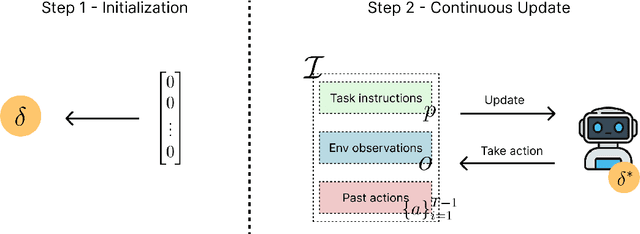
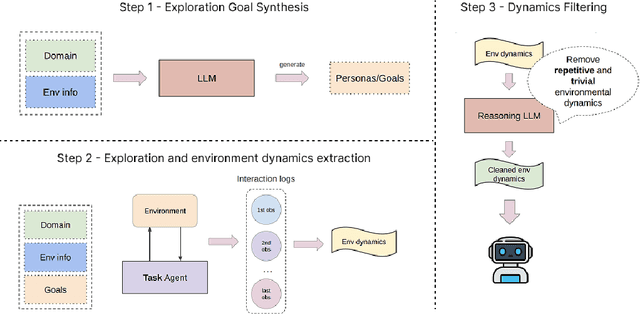
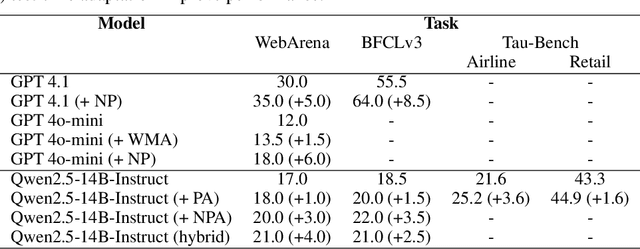

Abstract:Large language model (LLM)-based agents struggle to generalize to novel and complex environments, such as unseen websites or new sets of functions, due to a fundamental mismatch between their pre-training and test-time conditions. This challenge stems from two distinct failure modes: a syntactic misunderstanding of environment-specific components like observation formats, and a semantic misunderstanding of state-transition dynamics, which are only revealed at test time. To address these issues, we propose two distinct and complementary strategies for adapting LLM agents by leveraging environment-specific information available during deployment. First, an online distributional adaptation method parameterizes environmental nuances by learning a lightweight adaptation vector that biases the model's output distribution, enabling rapid alignment with an environment response format. Second, a deployment-time dynamics grounding method employs a persona-driven exploration phase to systematically probe and learn the environment's causal dynamics before task execution, equipping the agent with a nonparametric world model. We evaluate these strategies across diverse agentic benchmarks, including function calling and web navigation. Our empirical results show the effectiveness of both strategies across all benchmarks with minimal computational cost. We find that dynamics grounding is particularly effective in complex environments where unpredictable dynamics pose a major obstacle, demonstrating a robust path toward more generalizable and capable LLM-based agents. For example, on the WebArena multi-site split, this method increases the agent's success rate from 2% to 23%.
ToolLibGen: Scalable Automatic Tool Creation and Aggregation for LLM Reasoning
Oct 09, 2025



Abstract:Large Language Models (LLMs) equipped with external tools have demonstrated enhanced performance on complex reasoning tasks. The widespread adoption of this tool-augmented reasoning is hindered by the scarcity of domain-specific tools. For instance, in domains such as physics question answering, suitable and specialized tools are often missing. Recent work has explored automating tool creation by extracting reusable functions from Chain-of-Thought (CoT) reasoning traces; however, these approaches face a critical scalability bottleneck. As the number of generated tools grows, storing them in an unstructured collection leads to significant retrieval challenges, including an expanding search space and ambiguity between function-related tools. To address this, we propose a systematic approach to automatically refactor an unstructured collection of tools into a structured tool library. Our system first generates discrete, task-specific tools and clusters them into semantically coherent topics. Within each cluster, we introduce a multi-agent framework to consolidate scattered functionalities: a code agent refactors code to extract shared logic and creates versatile, aggregated tools, while a reviewing agent ensures that these aggregated tools maintain the complete functional capabilities of the original set. This process transforms numerous question-specific tools into a smaller set of powerful, aggregated tools without loss of functionality. Experimental results demonstrate that our approach significantly improves tool retrieval accuracy and overall reasoning performance across multiple reasoning tasks. Furthermore, our method shows enhanced scalability compared with baselines as the number of question-specific increases.
LoCoBench: A Benchmark for Long-Context Large Language Models in Complex Software Engineering
Sep 11, 2025



Abstract:The emergence of long-context language models with context windows extending to millions of tokens has created new opportunities for sophisticated code understanding and software development evaluation. We propose LoCoBench, a comprehensive benchmark specifically designed to evaluate long-context LLMs in realistic, complex software development scenarios. Unlike existing code evaluation benchmarks that focus on single-function completion or short-context tasks, LoCoBench addresses the critical evaluation gap for long-context capabilities that require understanding entire codebases, reasoning across multiple files, and maintaining architectural consistency across large-scale software systems. Our benchmark provides 8,000 evaluation scenarios systematically generated across 10 programming languages, with context lengths spanning 10K to 1M tokens, a 100x variation that enables precise assessment of long-context performance degradation in realistic software development settings. LoCoBench introduces 8 task categories that capture essential long-context capabilities: architectural understanding, cross-file refactoring, multi-session development, bug investigation, feature implementation, code comprehension, integration testing, and security analysis. Through a 5-phase pipeline, we create diverse, high-quality scenarios that challenge LLMs to reason about complex codebases at unprecedented scale. We introduce a comprehensive evaluation framework with 17 metrics across 4 dimensions, including 8 new evaluation metrics, combined in a LoCoBench Score (LCBS). Our evaluation of state-of-the-art long-context models reveals substantial performance gaps, demonstrating that long-context understanding in complex software development represents a significant unsolved challenge that demands more attention. LoCoBench is released at: https://github.com/SalesforceAIResearch/LoCoBench.
UserBench: An Interactive Gym Environment for User-Centric Agents
Jul 29, 2025


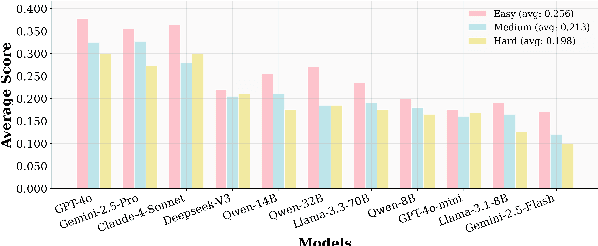
Abstract:Large Language Models (LLMs)-based agents have made impressive progress in reasoning and tool use, enabling them to solve complex tasks. However, their ability to proactively collaborate with users, especially when goals are vague, evolving, or indirectly expressed, remains underexplored. To address this gap, we introduce UserBench, a user-centric benchmark designed to evaluate agents in multi-turn, preference-driven interactions. UserBench features simulated users who start with underspecified goals and reveal preferences incrementally, requiring agents to proactively clarify intent and make grounded decisions with tools. Our evaluation of leading open- and closed-source LLMs reveals a significant disconnect between task completion and user alignment. For instance, models provide answers that fully align with all user intents only 20% of the time on average, and even the most advanced models uncover fewer than 30% of all user preferences through active interaction. These results highlight the challenges of building agents that are not just capable task executors, but true collaborative partners. UserBench offers an interactive environment to measure and advance this critical capability.
APIGen-MT: Agentic Pipeline for Multi-Turn Data Generation via Simulated Agent-Human Interplay
Apr 08, 2025Abstract:Training effective AI agents for multi-turn interactions requires high-quality data that captures realistic human-agent dynamics, yet such data is scarce and expensive to collect manually. We introduce APIGen-MT, a two-phase framework that generates verifiable and diverse multi-turn agent data. In the first phase, our agentic pipeline produces detailed task blueprints with ground-truth actions, leveraging a committee of LLM reviewers and iterative feedback loops. These blueprints are then transformed into complete interaction trajectories through simulated human-agent interplay. We train a family of models -- the xLAM-2-fc-r series with sizes ranging from 1B to 70B parameters. Our models outperform frontier models such as GPT-4o and Claude 3.5 on $\tau$-bench and BFCL benchmarks, with the smaller models surpassing their larger counterparts, particularly in multi-turn settings, while maintaining superior consistency across multiple trials. Comprehensive experiments demonstrate that our verified blueprint-to-details approach yields high-quality training data, enabling the development of more reliable, efficient, and capable agents. We open-source both the synthetic data collected and the trained xLAM-2-fc-r models to advance research in AI agents. Models are available on HuggingFace at https://huggingface.co/collections/Salesforce/xlam-2-67ef5be12949d8dcdae354c4 and project website is https://apigen-mt.github.io
Entropy-Based Block Pruning for Efficient Large Language Models
Apr 04, 2025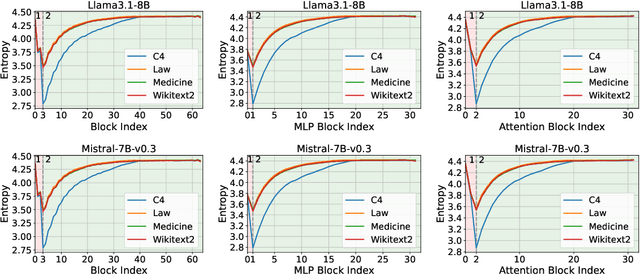
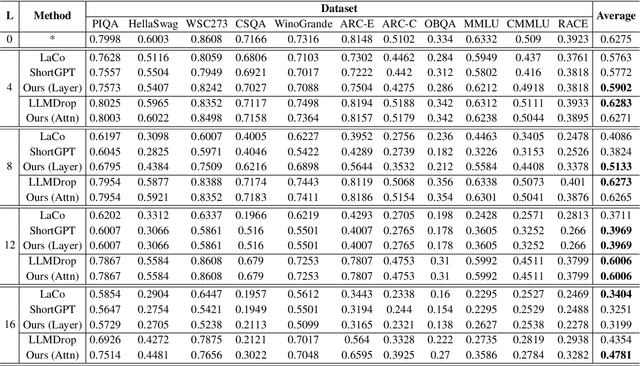
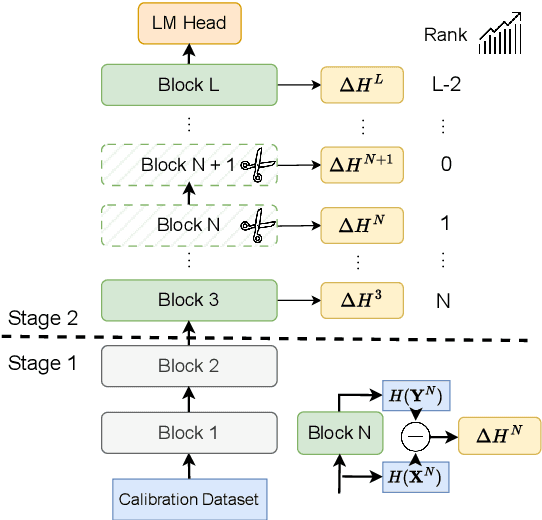
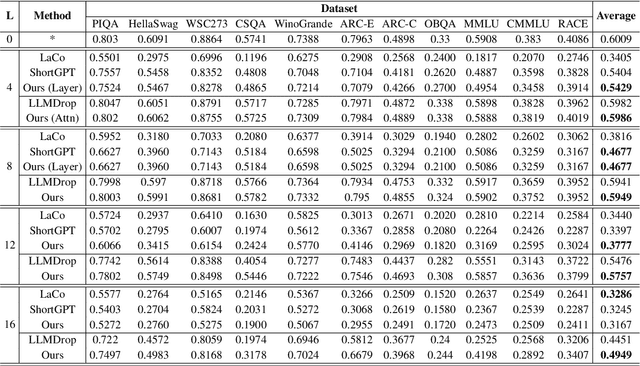
Abstract:As large language models continue to scale, their growing computational and storage demands pose significant challenges for real-world deployment. In this work, we investigate redundancy within Transformer-based models and propose an entropy-based pruning strategy to enhance efficiency while maintaining performance. Empirical analysis reveals that the entropy of hidden representations decreases in the early blocks but progressively increases across most subsequent blocks. This trend suggests that entropy serves as a more effective measure of information richness within computation blocks. Unlike cosine similarity, which primarily captures geometric relationships, entropy directly quantifies uncertainty and information content, making it a more reliable criterion for pruning. Extensive experiments demonstrate that our entropy-based pruning approach surpasses cosine similarity-based methods in reducing model size while preserving accuracy, offering a promising direction for efficient model deployment.
ActionStudio: A Lightweight Framework for Data and Training of Large Action Models
Mar 31, 2025Abstract:Action models are essential for enabling autonomous agents to perform complex tasks. However, training large action models remains challenging due to the diversity of agent environments and the complexity of agentic data. Despite growing interest, existing infrastructure provides limited support for scalable, agent-specific fine-tuning. We present ActionStudio, a lightweight and extensible data and training framework designed for large action models. ActionStudio unifies heterogeneous agent trajectories through a standardized format, supports diverse training paradigms including LoRA, full fine-tuning, and distributed setups, and integrates robust preprocessing and verification tools. We validate its effectiveness across both public and realistic industry benchmarks, demonstrating strong performance and practical scalability. We open-sourced code and data at https://github.com/SalesforceAIResearch/xLAM to facilitate research in the community.
 Add to Chrome
Add to Chrome Add to Firefox
Add to Firefox Add to Edge
Add to Edge